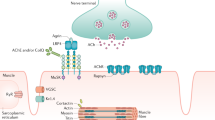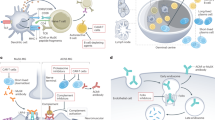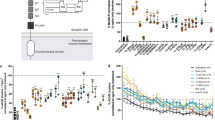Abstract
Myasthenia gravis (MG) is an antibody-mediated autoimmune disease of the neuromuscular junction. In approximately 80% of patients, auto-antibodies to the muscle nicotinic acetylcholine receptor (AChR) are present1. These antibodies cause loss of AChR numbers and function, and lead to failure of neuromuscular transmission with muscle weakness2. The pathogenic mechanisms acting in the 20% of patients with generalized MG who are seronegative for AChR-antibodies (AChR-Ab)3 have not been elucidated, but there is evidence that they also have an antibody-mediated disorder4,5, with the antibodies directed towards another, previously unidentified muscle-surface–membrane target6,7,8. Here we show that 70% of AChR-Ab–seronegative MG patients, but not AChR-Ab–seropositive MG patients, have serum auto-antibodies against the muscle-specific receptor tyrosine kinase, MuSK. MuSK mediates the agrin-induced clustering of AChRs during synapse formation, and is also expressed at the mature neuromuscular junction9,10,11,12. The MuSK antibodies were specific for the extracellular domains of MuSK expressed in transfected COS7 cells and strongly inhibited MuSK function in cultured myotubes. Our results indicate the involvement of MuSK antibodies in the pathogenesis of AChR-Ab–seronegative MG, thus defining two immunologically distinct forms of the disease. Measurement of MuSK antibodies will substantially aid diagnosis and clinical management.
This is a preview of subscription content, access via your institution
Access options
Subscribe to this journal
Receive 12 print issues and online access
$209.00 per year
only $17.42 per issue
Buy this article
- Purchase on Springer Link
- Instant access to full article PDF
Prices may be subject to local taxes which are calculated during checkout



Similar content being viewed by others
References
Lindstrom, J., Seybold, M.E., Lennon, V.A., Whittingham, S. & Duane, D.D. Antibody to acetylcholine receptor in myasthenia gravis: prevalence, clinical correlates and diagnostic values. Neurology 26, 1054–1059 (1976).
Drachman, D.B. Myasthenia gravis. New Engl. J. Med. 330, 1797–1810 (1994).
Sanders, D.B., Andrews, I., Howard, J.F. & Massey, J.M. Seronegative myasthenia gravis. Neurology 48, S40–S45 (1997).
Mossman, S., Vincent, A. & Newsom-Davis, J. Myasthenia gravis without acetylcholine-receptor antibody: a distinct disease entity. Lancet 1, 116–119 (1986).
Miers, A.K. & Havard, C.W.H. Diaphragmatic myasthenia in mother and child. Postgrad. Med. J . 61, 725–727 (1985).
Yamamoto, T. et al. Seronegative myasthenia gravis: a plasma factor inhibiting agonist-induced acetylcholine receptor function copurifies with IgM. Ann. Neurol. 30, 550–557 (1991).
Brooks, E.B., Pachner, A.R., Drachman, D.B. & Kantor, F.S. A sensitive rosetting assay for detection of acetylcholine receptor antibodies using BC3H-1 cells: positive results in 'antibody-negative' myasthenia gravis. J. Neuroimmunol. 28, 83–93 (1990).
Blaes, F., Beeson, D., Plested, P., Lang, B. & Vincent, A. IgG from "seronegative" myasthenia gravis patients binds to a muscle cell line, TE671, but not to human acetylcholine receptor. Ann. Neurol. 47, 504–510 (2000).
Valenzuela, D.M. et al. Receptor tyrosine kinase specific for the skeletal muscle lineage: expression in embryonic muscle, at the neuromuscular junction, and after injury. Neuron 15, 573–584 (1995).
Glass, D.J. et al. Agrin acts via a MuSK receptor complex. Cell 85, 513–523 (1996).
Hopf, C. & Hoch, W. Tyrosine phosphorylation of the muscle-specific kinase is exclusively induced by acetylcholine receptor-aggregating agrin fragments. Eur. J. Biochem. 253, 382–389 (1998).
Sanes, J.R. & Lichtman, J.W. Development of the vertebrate neuromuscular junction. Ann. Rev. Neurosci. 22, 389–442 (1999).
Hopf, C. & Hoch, W. Dimerization of the muscle-specific kinase induces tyrosine phosphorylation of acetylcholine receptors and their aggregation on the surface of myotubes. J. Biol. Chem. 273, 6467–6473 (1998).
Robertson, N.P., Deans, J. & Compston, D.A. Myasthenia Gravis: a population based epidemiological study in Cambridgeshire, England. J. Neurol. Neurosurg. Psychiatry 65, 492–496 (1998).
Aarli, J.A., Skeie, G.O., Mygland, A. & Gilhus, N.E. Muscle striation antibodies in myasthenia gravis. Diagnostic and functional significance. Ann. NY Acad. Sci. 841, 505–515 (1998).
Willcox, N., Schluep, M., Ritter, M.A. & Newsom-Davis, J. The thymus in seronegative myasthenia gravis patients. J. Neurol. 238, 256–261 (1991).
Zhou, H., Glass, D.J., Yancopoulos, G.D. & Sanes, J.R. Distinct domains of MuSK mediate its ability to induce and to associate with postsynaptic specializations. J. Cell Biol. 146, 1133–1146 (1999).
Drachman, D.B., De Silva, S., Ramsay, D. & Pestronk, A. Humoral pathogenesis of myathenia gravis. Ann. NY Acad. Sci. 505, 90–105 (1987).
Vincent, A. et al. Seronegative myasthenia gravis. Ann. NY Acad. Sci. 681, 529–538 (1993).
Nakano, S. & Engel, A.G. Myasthenia gravis: quantitative immunocytochemical analysis of inflammatory cells and detection of complement membrane attack complex at the end-plate in 30 patients. Neurology 43, 1167–1172 (1993).
Newsom-Davis, J. Autoantibody-mediated channelopathies at the neuromuscular junction. The Neuroscientist 3, 337–346 (1997).
Taylor, S.I., Barbetti, F., Accili, D., Roth, J. & Gorden, P. Syndromes of autoimmunity and hypoglycaemia. Autoantibodies directed against insulin and its receptor. Endocrinol. Metab. Clin. North Am. 18, 123–143 (1989).
Robertson, S.C., Tynan, J.A. & Donoghue, D.J. RTK mutations and human syndromes: when good receptors turn bad. Trends Genet. 16, 265–271 (2000).
Vincent, A. & Newsom-Davis, J. Acetylcholine receptor antibodies as a diagnostic test for myasthenia gravis: results in 153 validated cases and 2967 diagnostic assays. J. Neurol. Neurosurg. Psychiatry 48, 1246–1252 (1985).
Hopf, C. & Hoch, W. Heparin inhibits acetylcholine receptor aggregation at two distinct steps in the agrin-induced pathway. Eur. J. Neurosci. 9, 1170–1177 (1997).
Acknowledgements
We thank U. Schwarz for his support; C. Hopf for participating in cloning some of the constructs; A. Evoli and S. Robb for two of the plasmas and clinical information; and C.-M. Becker, C. Schuster and D. Roberts for critical reading of the manuscript. JMcC is supported by a Wellcome Trust Research Training Fellowship. J.N.-D. and A.V. thank the Muscular Dystrophy Campaign/Myasthenia Gravis Association for support.
Author information
Authors and Affiliations
Corresponding authors
Rights and permissions
About this article
Cite this article
Hoch, W., McConville, J., Helms, S. et al. Auto-antibodies to the receptor tyrosine kinase MuSK in patients with myasthenia gravis without acetylcholine receptor antibodies. Nat Med 7, 365–368 (2001). https://doi.org/10.1038/85520
Received:
Accepted:
Issue Date:
DOI: https://doi.org/10.1038/85520
This article is cited by
-
Fast, multiplexable and efficient somatic gene deletions in adult mouse skeletal muscle fibers using AAV-CRISPR/Cas9
Nature Communications (2023)
-
Residual serum fibrinogen as a universal biomarker for all serotypes of Myasthenia gravis
Scientific Reports (2023)
-
Ocular Myasthenia Gravis
Current Treatment Options in Neurology (2023)
-
DOK7 Promotes NMJ Regeneration After Nerve Injury
Molecular Neurobiology (2023)
-
The Beneficial Clinical Effects of Teriflunomide in Experimental Autoimmune Myasthenia Gravis and the Investigation of the Possible Immunological Mechanisms
Cellular and Molecular Neurobiology (2023)



